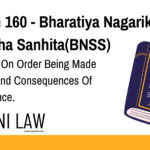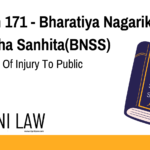Code:
- A police officer knowing of a design to commit any cognizable offence may arrest, without orders from a Judicial Magistrate and without a warrant, the person so designing, if it appears to such officer that the commission of the offence cannot be otherwise prevented.
- No person arrested under sub-section (1) shall be detained in custody for a period exceeding twenty-four hours from the time of his arrest unless his further detention is required or authorized under any other provisions of this Sanhita or of any other law for the time being in force.
Explanation:
This section empowers a police officer to arrest an individual without a warrant if they have reason to believe that the person is planning to commit a cognizable offense. The officer must have knowledge of the design to commit the offense and believe that the crime cannot be prevented otherwise. This section aims to prevent serious crimes by arresting individuals before they can carry them out. Here is the review of what arrest to prevent commission of cognizable offences deals with:
Illustration:
Suppose a police officer receives information that a group of individuals is planning to rob a bank. The officer has reason to believe that the robbery is imminent and cannot be stopped without arresting the suspects. In this scenario, the officer can arrest the suspects without a warrant under Section 151 of the BNSS. The officer must have sufficient grounds to believe that the individuals are indeed planning the robbery and that their actions are likely to result in a crime being committed.
Common Questions and Answers:
Q: What is a cognizable offense?
A: A cognizable offense is an offense for which a police officer can arrest a person without a warrant. Examples include murder, rape, theft, and assault.
Q: What are the limitations on detention under Section 151?
A: A person arrested under Section 151 cannot be detained for more than 24 hours unless their detention is authorized under other provisions of the BNSS or any other law.
Q: Does the police officer need to have proof of the design to commit an offense before making an arrest?
A: No, the police officer only needs to have “reason to believe” that the person is planning to commit an offense. However, the officer’s belief must be based on reasonable grounds and not mere suspicion.
Q: Can a person arrested under Section 151 be released on bail?
A: Yes, a person arrested under Section 151 can be released on bail under the provisions of the BNSS.









